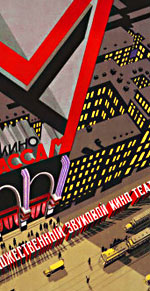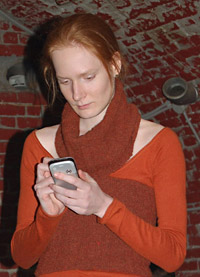
| Jacket 36 — Late 2008 | Jacket 36 Contents page | Jacket Homepage | Search Jacket |
This piece is about 7 printed pages long. It is copyright © Julia Idlis and Peter Golub and Jacket magazine 2008. See our [»»] Copyright notice. The Internet address of this page is http://jacketmagazine.com/36/rus-idlis-trb-golub.shtml

Back to the Russian poetry Contents list
***
You love a certain person.
And this person loves that other person
because everybody loves somebody but — God loves everybody.
— James Joyce, Ulysses
someone walks on the parquet
half a
step ahead of me,
half animal, half shadow
(from the waist
down)
not frightened by noise
unthreatened by what may
come
scattering ears of corn around the fire
watching me attentively
scratching himself with a hoof between the crooked shadows
finishing
my tea before I had a swallow
sees me off along the wall
an overseas
miracle
cleans my cups with arsenic
the horse turns yak
horns
and beard
and a tail from under the overcoat
my pale sweetie, he says,
here is an orach mignonette
ba-ba-ba da-da-da
well?
enters
through the auditory canal
an intracranial examination, taps at the
temple,
grins from under the printer:
...totals the
detriment...
Jesus loves me
from the top and
slanted
***
Magdolin Manon — a french girl —
died here.
she was a terrible whore, because no one loved her,
because she loved everyone, half-price;
she always told herself
“we:”
“this,” she would say, “is us; and
this,” she would say, “is not us.”
they say, that
she once had a large vocabulary:
A small encyclopedia from “a”
to “you”.
but then someone happened to her–lodged in her
throat, it became hard to breath,
she coughed for an entire month after
that, couldn’t sleep,
wouldn’t eat, only drank.
he
would visit her at night,
everyone saw it, how she would kiss his prick,
“we,” she would say, “we”
later it became
clear, that she said it in reference to herself,
but at the time no one
understood anything–thought, maybe it was just a phase.
in the end
she sat alone in a dark room,
would suddenly jump up, grab a needle,
thread,
bite off a few lines from some old poem,
and sew it little
hands and feet,
“we,” she would say, “we”
and take it into her hands, coughing and coughing...
but enough, I
already said, what a terrible whore she was.
***
And there were no living, nor dead along the banks of the river, only the ancient fishermen growing stone-faced; each with his magic wand in an outstretched hand, watching the sun melt in the distance.
And each one silent and crude; below a mass of feathered fish, and each one wept, the hand closed tight, and said:
Old man, who looks upon us from the heavens, you handed us willow branches, ox sinews, you who disdains us, what will you do, when we stop living? Therefore, we hold two-ended sticks, and death is on each end; they crack and bend, the yokes are almost scale; by them we measure, whose death is heavier and closer to the earth–theirs or ours, and why does the son die daily, drowning on the cross in words of forgiveness in an astral emptiness.
He says: dad,dad, I was swimming well enough, but you took me into your hands, away from the river’s breast, and now I do not know who I am, take pity on me, have mercy, I am still two-thirds holy water.
The father replies: don’t thrash in my arms, I love you, won’t let anyone have you; you will have water salted with fine down, hot unction, a wood frying-pan. Those who hear me will be full of your spirit, with worn-out shoes, washed-out names; but you won’t remember a single one of them, because we all wear the same face, not one of us is without sin, and I with them. Since there is nothing to feed my children, except your flesh.
And there were no living, nor dead in the river, and the feathered fish beat on the golden hooks; the rods
whined, bending, almost touching the water; the river stood naked, recognizing
its plight. And only one, who saw, the vermillion sun melt away, and there, he
dug himself into the soft silt and wet sand, heard a fin idlely beat the air, he
lay down quietly, and thought about the cesarean river, watched, hiding in the
empty rush, how the spring gives birth to water.
***
My
pain was born eight years before me
In a small town near another small
town;
I wonder how it got on without me, probably ran around bare
foot,
grew big and strong?
who watched it, picked it up, out of pity
let it climb into their bed,
so that it could warm up and begin
talking-talking,
so that its trembling wet words could take shape
of
warm bodies, bodies cool, foreign bodies?
my pain grew up,
took me into its hands, and said: dance, dance,
I am inside you, right
here, and put its palm under my heart,
my what a nice chest you have,
I say, this is where my happiness grows soon it will be time for it to
leave
but in truth I don’t believe it, I cry, and try to hide,
mom, I say, my happiness is crying, it probably wants something to
drink;
my pain closes its eyes, grows silent–probably wants to fall
asleep
there is a straw breeze blowing through my heart, how am I to
live
a city in the middle of a town?
come on, says my pain,
you’ve visited your mother, it is time to see your father,
ask him
what we should do, let him tell us, after all,
how can you live without
your left breast or my right hand
in Town, this enormous city .
***
the old baron is dying.
hasn’t eaten a
thing in three days,
doesn’t answer to his name,
stands at the
window all day,
says that he is listening,
to the approaching
winter.
someone needs to summon the baronet from the city.
I
said, send a runner to the city:
the old baron is dying
he is leaving
everything unattended:
the red hair resting just below the shoulders.
a wonderful pair of legs,
again, a thin waist, shapely
breasts
a nearly ideal form,
a fantastic pair of eyes and long slim
fingers,
this beauty cannot be allowed
to fall into someone
else’s hands:
a traveling sales man,
the neighbor, who happened
to offer the quill and will at the right time
a rat, who peeked from behind
the armoire,
when the baron was about to hang himself.
the old
baron is dying,
he says: after my birth
they placed me on the
table,
and the entire night I thought,
that tables never ended,
because they have no end.
after my death
the only meaningful
thing,
will be the testament;
this is why you must call the baronet
from the city,
let him arrive after he has finished all his important
affairs,
smelling of a hundred exhausted women
suicide
and tin
soldiers from a child’s bathtub.
let him come, I say.
I
will whisper to him a few words,
and then everything will grow
quiet;
he will embrace this body
unexpectedly delicate, as if
sewn from the lightest ideas,
he will wrap me in blankets and think,
what is this, ultimately everything he has,
he has because everything
is mortal,
which sometimes comes
like this, with quiet snowfall,
it is rather
some kind of new life, where this body
belongs
entirely to him, with everything, that is inside,
what he never accounted
for
and never hoped to receive.
in my youth it seemed
that
the old baron would never, never...
now you begin to understand, that
eternal things,
for instance God, memory, compassion,
are also
perishable
and are fated to disintegrate
in each individual body.
and the sun as well.
the young baronet walks along the
corridor,
touching the curtains, wiping a bit of dust off the portraits,
half the faces odious,
the other half unknown.
he is
constantly speaking
with the echo made by his careful feet
and the
air in the gallery;
here he is opening the door,
he walks into the
room and sits at the window,
he speaks, lulling each word,
with his
tongue,
putting his lips to the surrounding air,
intrigued, by how
the flavors change
with his words.
the old baron has died
inside me,
the baronet continues,
so that he may sit and listen,
how the winter passes,
on the inside of the century,
his eyes
closed.
***
after you leave, the window overgrows
with green
rustling drops on the warm, amalgamated, saline
the
rustling of a shale on the useless, tired, hunched
the mire like a
woman’s name in the mouth of a whale
the picture moves the whale
swallows space
chewing the wires, stirring with his dark red tail
in
the mix of something unheard small stars say hello,
I am in your dream in
— remember, yes, the black velvet?
well, here you are, already
stirring the warm velvet with the hand
the shoes crack over broken
glass
you’ll be there — you won’t be
late?
***
you say and you tell me let’s be
together
let us say somewhere, take care of yourself
swim to the bank,
you yell, turn
you have eyes on the back of your head, windows in your
back.
I say I don’t need anything from you
I say there
is nothing meaningful about you
just want to hold you if that’s
possible
somewhere lets us say sometime soon
my heart is thawing my
back has thawed.
he says he tells us but we don’t
hear
amavi amo ave maria dolce
swim you are always in my palms
my palms are everywhere
here, on your back around your heart,
nothing
can be heard, no sound breaks through,
sleep well.

Julia Idlis
Julia Idlis (b. 1981, Moscow) holds a graduate degree in philology from Moscow State University. Her dissertation focused on the work of Harold Pinter. In 2004 she won the Debut Prize, in the category of criticism. She has two books, including Air Water (2005). English translations of her work can be found in Zone: International Poetry and Prose and Caketrain.